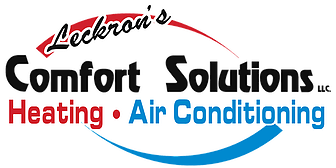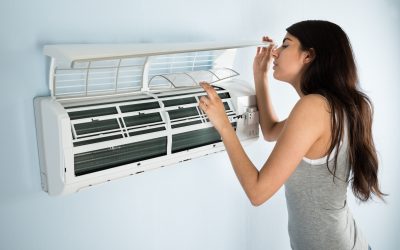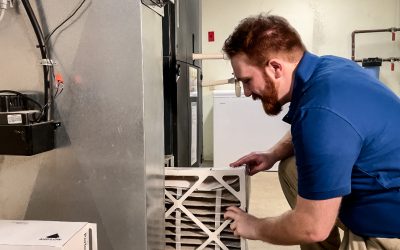In today’s world, we are battling extreme weather. Our weather here in PA matches that sentiment. From sweltering heat one day to plunging cold temperatures the next, we rely on our HVAC system to keep our home temperature liveable.
Yet, with increased weather fluctuations and busier lifestyles, the unexpected HVAC breakdown can lead us to a state of panic – especially during a heat or freeze spell. Knowing what common problems occur in HVAC systems allows us to keep tabs on our units, troubleshooting before a click or bang turns into a complete replacement.
Common HVAC Problems
Refrigerant Leaks
Unfortunately, refrigerant leaks are not uncommon. Have you ever had your air conditioning kick on, and the air is less cool than you remember it to be? A refrigerant leak could be the cause of this unexpected warmth. As these leaks happen, it is crucial to know how to pinpoint them and what to do when they occur.
Causes and signs of refrigerant leaks
- A humid and poorly cooled home: the purpose of air conditioning is to cool down our homes. We understand how the summer humidity quickly causes a sweltering home in Pennsylvania. When our AC is not cooling our house, or there is just a sticky humidity to our indoor air, your refrigerant is likely to blame.
- Your air conditioning is running for a long time: when your thermostat registers your home warmer than it should be, it will not kick off your air conditioning. It will simply attempt to cool the air, but since it is not cooling to the level it should be, the AC will remain on – taking longer to cool down your home. If you notice your AC unit is running longer than expected, it is time to check out your refrigerant.
- Your monthly bills are increasing:it takes more energy to run your AC longer. Even if you are not home often enough to witness the length of your AC cycle, you will notice if your bills cost you more than in past months. Check out your bills – if they are rising for no real reason, it could be your refrigerant.
- Check for ice: your evaporator coils don’t lie. If you can see ice forming on the evaporator coil, call Leckron’s Comfort Solutions immediately.
- Odd sounds coming from your unit: if your unit isn’t running, it should be quiet. When bubbling and hissing sounds are escaping from your indoor or outdoor unit, you could be looking at a refrigerant leak.
Potential health and environmental risks
Refrigerant is Freon, which is a danger to human health, tasteless, and has no smell. Although it seems that would mean it is harmless – it is anything but. Freon impacts your air quality and respiratory system to a life-threatening level.
Breathing difficulty, headaches, nausea, vomiting, skin and eye irritation, and coughing are all signs of refrigerant poisoning. If you are experiencing these conditions, leave your home and call for help immediately. If exposure continues, the symptoms can progress to labored breathing, irregular heartbeat, confusion, mental fatigue, fluid in the lungs, loss of consciousness, and seizures. Contact a doctor immediately if experiencing any of these signs.
Repair Costs and Factors Affecting Costs of Repair
Without refrigerant, you cannot cool your home. However, refrigerants are hazardous and take a particular certification to work with refrigerants. Do not attempt to fix a refrigerant repair – call Leckron’s to help. The risk of accidental poisoning is not worth it.
Repairs cost around $650-$1200, depending on the issue. The longer you wait, the more complicated it could become. If the problem extends beyond just refrigerant and to broken coils or a replacement compressor, these could quickly add up to $2,000-$3,000. The sooner you contact a technician, the less chance of a problem spiraling into a replacement.
Faulty Compressor
A compressor is the heart of your system. It is responsible for pumping the refrigerant through the system and bringing the heat from the inside to the outdoor unit to cool. Without the compressor, nothing works, very much like without a heart, our blood cannot pump.
Symptoms of a faulty compressor
- Unusual Noises: A humming is a standard AC sound. When noises start beyond this typical hum, it signifies issues. Ticking, rattling, rumbling, or chattering could be signs of a dying compressor. Give Leckron Comfort Solutions a call right away so we can fix any issues before they spiral into a broken part.
- Uncooled AC: while this could be refrigerant leaking, it also is a sign the compressor is not working. If the compressor cannot push refrigerant to cool down the air, it goes to reason that cool air won’t come out of the vents.
- Airflow decreases: less airflow means a weak compressor
- Tripping circuit breaker: if the compressor has to work harder to push the refrigerant around or pull out the hot air, it may overheat, causing your breaker to trip.
- Vibrations during start up: vibrating during start-up is referred to as a hard start, which means exactly as it sounds – the compressor is having difficulty starting up. Call Leckron’s to check it out.
Repair options and associated expenses
A brand-new compressor costs between $800-$3000. If the compressor is for a mini-split, it costs much less- hovering around the $100 mark. Repairs on a compressor generally run between $400-$1200. If your unit is 10-12 years old, it may be more cost-effective to buy a new unit than repair the current compressor.
Ignition Control or Pilot Problems
When your system is having trouble igniting, the reason could vary greatly. It could be a minor issue to a life-threatening one. If you smell gas, leave immediately and call your gas company.
Without your furnace igniting, your system cannot heat. Call Leckron’s Comfort Solutions to troubleshoot and fix your ignition control or pilot light if the reason is not a simple fix. Repairs often involve natural gas and high-voltage electricity – these fixes are best left to the professionals.
Identifying signs of ignition control or pilot problems
- Blinking Lights on your Furnace: your manual will have a guide for what each blinking light represents. If you lost your manual, check the manufacturer’s website or use Google. Often, this information is listed online. Call the manufacturer’s customer service number if you still cannot find anything.
- Dirty Filters: this easy fix you can do yourself. Replace your filter about every three months. When it is overloaded with filth, dirt and dust can go into the unit, clogging it. If changing your filter does nothing, it is likely not the cause of the issue.
- Defective Ignitor or Pilot Light: what does your furnace do when it tries to ignite? Is it clicking but won’t ignite? The issue is likely the electronic ignition system. If it starts up but quickly goes out, it probably needs a new standing pilot light.
- Dirty Burners: dirt accumulation on the burners stops them from burning properly. It creates a dangerous situation that can cause more carbon monoxide in your system. Dust them off by blowing compressed air or wiping them with a rag. Frequent dusting of your home can help prevent this issue.
- Broken Flame Sensor: this sensor tells your unit if it should be firing and will shut down if it receives a faulty flame signal. The risk here is your system overheating and burning up early. Clean your system’s air vents and unplug it until a technician can troubleshoot your system.
- Gas Supply Problem: the gas line is the most common reason for issues with igniting. Tree branches and debris obstruct the gas line. Often, this is a city gas line issue. Technicians evaluate where the obstruction is and help fix it if it is part of the city’s gas line. There could also be issues with the pressure in the gas line, indicating the line your system has is inadequate. A trained technician can measure what your system requires and if the current line is adequate. Too much gas can damage the internal components of your system. Your technician can help identify what your system needs.
- Faulty Thermostat: if your thermostat is not reading the temperature correctly or fails to signal the central unit, your system will not know whether to kick on or off. Check your thermostat’s battery. If this does not solve the issue, you can replace the thermostat; however, calling for a technician may be more appropriate as there could be underlying reasons for your thermostat not working correctly.
- Drafts: just like it is difficult to light a bonfire in a windstorm, if your basement has a strong draft, it may prevent the pilot light from igniting. The draft motor should pull air in and out of your chimney or vent; however, if it goes bad or is blocked, it will be incapable of doing this. If you hear a muffled hum, it’s a sign of a blockage.
Repair and replacement costs
Depending on the issue, your repair and replacement costs range from $100-$250. Something as simple as changing a filter is around $30, but most problems requiring a trained technician will run a bit higher.
Blown Capacitors
The capacitor is responsible for providing the initial burst of electricity to start the motors. Think of it like a battery. It stores the electricity, and when it’s time to release it, it does so with a powerful enough blast that the unit can rev up. Air conditioners have two types of capacitors: start capacitors and run capacitors. If the capacitor is faulty, it can short-circuit, overheat, or break down. A power surge from lightning can also cause a blown capacitor. Eventually, normal wear and tear of a unit can push a capacitor to break down.
Thankfully, diagnosing a blown capacitor is relatively easy for trained technicians. They use a multimeter device to test the voltage rating across terminals.
Recognizing symptoms of blown capacitors
- Electrical smell or smoke around the unit
- Burning smell by the outdoor unit
- Fluid oozing around the capacitor or circuit board
- Clicking sounds like the machine is trying to start but cannot
- Humming noise around the outdoor unit
- Cracks or bulges in your unit
- Rising energy bills
- Unexpected system shut off, or unit won’t start up
- Hard start causing vibrations during start-up
- The unit won’t blow cold air
Repair and potential collateral damages
To fix the capacitor, expect to spend anywhere from $100 to $400 for parts and labor. That said, once the capacitor starts to go, the unit generally starts to have issues in other areas. For example, if the compressor is damaged, it could run you up in the thousands of dollars range.
Having a trusted HVAC company comes in handy. At Leckron’s, our technicians evaluate a unit and explain your various options and what potential problems are in store for your unit. They understand not everyone can fully replace a unit and may have to stretch the current one. When you have a company you can trust to tell you the truth versus upselling you, you can rest assured that you have made the best decision for your family’s home.
Clogged Air Filters
Air filters are one of the most homeowner-friendly repairs. As a homeowner, you have various options for air filters, but the bottom line is that you should change them at least every three months. If you have someone who is very ill, suffers from extreme allergies, or smokes indoors, you should change them more frequently than this.
When your air filter is clogged or simply too dirty, your system doesn’t necessarily recognize that. What it does do, though, is attempt to push air through the filters. Because it takes longer to do this with a dirty filter, air is delivered slowly to the rooms needing to be cooled down, giving the air time to lose its chill. This loss of efficiency leads to an increase in your monthly energy bills and a general wear-out of your unit.
Indications of clogged air filters
Usually, you can open your unit and look at your air filter to see if it needs a replacement. However, there are other signs to look for, especially if it has been a while since your last air filter change. You may notice that you are using more energy on your monthly bills, your heating or cooling seems uneven or the cycles are short, your indoor air quality may decrease, your home is dustier than expected, there is a burning smell to the air, or your family members appear to be getting sick more often.
Cost-effective solutions and potential consequences of neglect
When you don’t change your air filters often enough, your system has to work hard to do the same job. As a result, it undoubtedly will wear out quicker, leading to more repairs, especially to the fan. Eventually, you will need a replacement.
The most effective action you can take is to set up a system reminding you to change your filters. Having them delivered or working with one of Leckron’s maintenance plans, where the technician automatically replaces the filter during inspections, creates a method to change the filter at least every three months.
Factors Influencing Repair Costs
Of course, as with any household repair, there is an extensive range of costs. If your dishwasher breaks down, a unit alone can cost between $300-$3000, depending on your desired bells and whistles. Your HVAC system and repairs are no different.
Should your system suffer an extreme HVAC system breakdown, the repairs could be so significant it makes more sense to replace the whole system. The brand and type of system (smart home versus traditional) all influence the cost. Labor may need to be extensive or a quick fix. Emergency repairs come at a higher price, as they are not scheduled and require a visit off-hours, primarily due to a breakdown.
Repair vs. Replacement
The question becomes, do we repair or replace? We don’t need to replace an entire unit because the filter needs changing. But at times, a complete system replacement is more economical.
If your system is older, you absolutely should consider replacing it. As HVAC systems age, they are more prone to breakdowns. Constantly repairing them eventually nickels and dimes you to a higher cost than just replacing the system. Plus, with the increased technological advancements and energy efficiency, you will likely save money on your bills, helping cushion the cost of a new system. Furnaces and boilers usually need replacing every 15 years, and air conditioners’ lifespans are generally around the decade mark.
Speak with your technicians about the problems with your unit and ask their opinion on your unit’s condition, as well as the advances, financing options, rebates, and tax breaks involved with replacing. It may be better to bite the bullet than prolong the inevitable.
Preventive Measures and Maintenance
Like our cars, the more we care for our unit, the longer it will last. Oil changes and checkups for vehicles are equivalent to maintenance plans, filter replacements, and seasonal checks.
Not every bit of maintenance needs to be completed by a professional. You can change your filters, clean your ducts and registers, check your evaporator drain, clean debris on and around your outdoor unit, flip your fans on occasionally, and turn off your humidifier from time to time.
Past this, a regular maintenance plan is your best money-saving option. Think of it like a car inspection – an experienced technician knows what to look for when evaluating your system. They have tools that allow them to run diagnostics on your unit, checking for decreased performance.
Depending on your specific needs and plan, our Leckron’s technicians handle critical tasks like:
- Ensure the thermostat is installed correctly and away from heat sources
- Tighten electrical connections
- Check system control for appropriate performance
- Lubricate moving parts against wear and tear from friction
- Check the condensate drain line for clogs and water leaks
- Repair refrigerant leaks and recharge, if necessary
- Check for gas leaks in the fuel line
- Examine the heat exchanger for cracks and carbon monoxide leaks
- Clean and adjust the burners
- Check the furnace fan switch
- Ensure combustion air openings are clear
- Verify furnace safety controls are functioning properly
- Conduct tune-ups, performance checks, and visual inspections of all components
Maintenance plans significantly reduce the long-term price of your HVAC system. Because most issues can be fixed before they spiral into an emergency-late-night-freezing-weather phone call, you save money in the long run and rest assured that your system will be ready when needed.
Live in Comfort with Leckron’s
At Leckron Comfort Solutions, we understand HVAC systems break down at the most inconvenient time. Still, we also think of our customers as family. We will do everything in our power to be there when your system decides it’s time to fizzle out.
Yet, we don’t want you left in the cold – literally – and so we work with our customers to set up affordable and convenient maintenance plans so they are covered year-round. These let us stay on top of your unit, monitoring it through its lifespan and helping you prepare for options as we near its replacement time. We will inform you of specials, rebates, tax incentives, and financing options.
My AC suddenly stopped working. I have COPD and cannot breathe in the heat. They called me back and had a tech finish early and he could come right away. He had the AC up and running in no time. These people are wonderful and I am so thankful they were here for me. I will continue to call them every time I need them. I would recommend them highly. – Wanda S., Customer
Find out why so many in the community have made Leckron’s their partner in their home’s HVAC needs. Call us today to discuss how we can set you up for year-round comfort.




